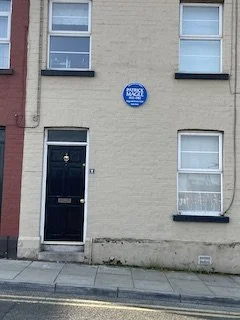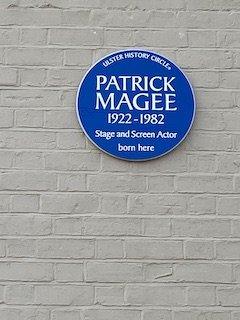Book Review - Trespasses - Louise Kennedy
‘Trespasses’ by Louise Kennedy begins in 1975 and the North of Ireland is tearing itself apart. Twenty Five year old Cushla Lavery lives with her mother and works part time at the family bar in a Garrison town, when she gets involved with a Protestant barrister nearly twice her age who asks her to teach him and a couple of his friends some Irish. Her other job is as a teacher and after an act of kindness towards a child who turns up at school with no coat, finds herself befriending a family from a mixed marriage living under constant threat in a loyalist housing estate.
Each school day begins with the news headlines, at the behest of the principal ‘to encourage children to be aware of the world around them.’ So these seven year olds start their day hearing ‘A booby trap bomb that was intended for a British Army patrol exploded prematurely, killing two boys near the border. They died instantly.’ It says something of my own memories that I thought this referred to something that happened in my own home town. There’s a mental rolodex of atrocities you can flick through. I was also a primary school child during the seventies and these were the headlines you were hearing constantly on the TV, radio or headlines in newspapers. As a characters says at one point, ‘Children here know too much.’
Atmosphere
The writing is clear, sharp and crisp, conjuring up memories from my own school days.
‘Cushla doled out squat bottles of milk from the crate paddy the caretaker left bizarrely by the radiator every morning and told the children to take a few extra minutes. They lingered by her desk, ripping off he foil caps and stabbing their tongues into the inch of cream that had settled on top.’
The atmosphere in ‘trespasses’ is often overwhelming and oppressive, and weighs heavy on the pages. It feels monochrome and battleship gray, something like the grainy pictures we see when there’s a flashback to these times on TV. But Louise Kennedy makes it feel fully alive, and vibrant, with such a strong sense of place and time, not like anything I’ve read in a while.
One of the things I did notice as I read was the occasional gaudy colour making an appearance, with ‘purple and orange dressing gowns,’ ‘three quarter length coat in orangey shade of tan,’ ‘wall tiles with orange geometric patterns.’
Clockwork orange
Speaking of orange, there’s also an interesting reference to Stanely Kubricks ‘A Clockwork Orange’, a film I was obsessed with in my teenage years, as well as Burgesses’ book of the same name. Micheal, the barrister mentions the ‘exquisite violence’ of the movie, and that Patrick Magee, who played the writer Frank Alexander in the movie, was from Armagh. I must admit I didn’t know this but I had seen the plaque in Edward St that marks his place of birth. There’s a bit of foreshadowing going on here as Alexander is left in a wheelchair after a horrific beating at the hands of Alex and his droogs, as a character in this book also suffers an act of extreme ‘ultra violence.’
(On a personal side note – I once dressed as a droog for a fancy dress party in the late nineties whilst living in Belfast. In a white disposable overall, along with a cane and even a bit of fake eyelashes makeup, I’m pretty sure I was the only person with a bowler hat allowed to walk down the Ormeau Road that year.)
Prose
The prose is sparse and lean, often startling in its clearness. And although the sentences might be short and pointed, there’s such emotion running through the book. There’s an incredible feeling of tension that builds throughout the book. Like the times themselves, tragedy and heartbreak were never too far away.
What’s also recognisable to anybody from the north reading ‘trespasses’ is a the rich seam of black humour that runs throughout. This was much needed in terms of coping, of dealing with the psychological weight of the times. If you didn’t laugh, you’d crack up. Gina, Cushla’s alcoholic mother ( ‘Aye but I’m not a hundred percent today, said Gina. She was a hundred per cent hung over, eyeballs juicy, the skin around them puckered) is especially caustic. On the radio once morning we hear the announcer say:
‘The body of a man was found off the shore road by a woman out walking her dog.
‘I wouldn’t thank you for a dog, said Gina. You’d be odds-on to find a corpse.’
Another bit that made gave me a much needed laugh later, a place I also visited on a school trip:
Cushla and Gerry were bringing their classes to the park for a picnic; next year they would have a proper school trip, a visit to the safari park on the north coast, where the biggest attraction was a monkey that smoked benson and hedges.’
Some characters made my skin crawl. When Slattery the priest enters the story, I couldn’t wait until he exited stage left. He ‘roamed the playground and school corridors, entering the classroom unannounced to deliver his frightful catechism.’ There’s one great moment when he’s telling these young children about Loyalist murder gangs and their torture rooms , when a teacher bravely interjects with his guitar to start up a song.
Cushla
I found Cushla a sympathetic character, juggling these intense emotions and all the other shit going on. The love affair gives the book a much needed lightness, even though the trespasses of the title refers to the ‘sin’ we’d associate with the bible. (Just thinking about it now, I suppose the other trespass relates to the McGeown family living where they did.) It feels like like the only hope that Cushla has, the only source of joy in her life and I wanted badly for it to continue for her. The affair felt real and intense.
Trespasses Summary
‘Trespasses’ is one of the best novels I’ve read on the north in some time. It’s painfully realistic to read, sometimes depressing, always brave, and tough going but that’s as it should be. At times it made me emotional and angry and I thought about things I hadn’t for a long time. A book from this period, told honestly, couldn’t really be anything else.
I’m reading ‘On bloody Sunday’ at the moment and once I have that reviewed I don’t think I can read any more books about the troubles for another while. This one dug into me deeply and will be with me for some time yet.
Book review - Tresspasses by Louise Kennedy
Published by Bloomsbury 14th April 2022
320 pages
Thank you to Netgalley and Bloomsbury for the Advanced Reader Copy in exchange for an honest review.




